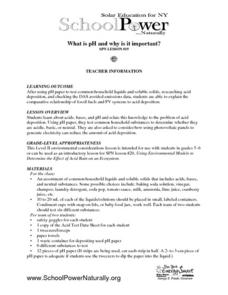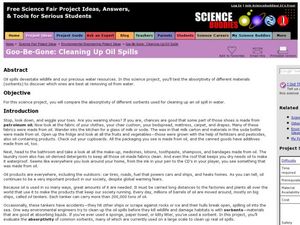Curated OER
Picture This
Give your littlest learners the opportunity to learn how to discuss, observe, and visualize. First, they determine if the image they are looking at is a photograph or a painting. Then they work together to brainstorm words that describe...
American Chemical Society
Exploring Baking Powder
Meant to follow an activity in which young chemists identified an unknown substance by chemical reactions, they now take their data and use it to determine which materials combine to make up baking powder. This instructional activity is...
City University of New York
Electoral College
A presidential election is a lot like the 2004 World Series, and it's also a lot like choosing an orange in a paper bag. Apply the process of the electoral college to these two analogies with a set of lessons about government...
101 Questions
You Pour, I Choose
Tall and skinny or short and stout, which glass hold the most liquid? Learners analyze dimensions of cylindrical glasses to determine the one holding the greatest amount of liquid. They brainstorm the relevant dimensions before making...
Concord Consortium
Summertopia
What if the unit of money changes tomorrow? Would you be prepared? Learners calculate currency conversions using fictional units of money. The fictional unit's base is 60 rather than 100, which can connect to time or even degrees.
Curated OER
Chasing Metaphors
Students use metaphors in order to see commonly experienced objects, events, and people in new and more meaningful ways.
Curated OER
Mentos Geyser! What's the Fizz Factor?
What is it that makes Mentos candy and cola such an explosive combination? Find out through scientific inquiry and experimentation. This presentation walks learners through the scientific process and allows them to speculate whether it...
Curated OER
What is pH and Why is It Important?
Students investigate about acids, bases, and pH and relate this information to the problem of acid deposition. They use pH paper, students test common household substances to determine whether they are acidic, basic, or neutral. Pupils...
Curated OER
Science: The States of Matter
Third graders conduct experiments in matter to create chemical changes resulting in gases. By mixing solids and liquids, they create a chemical reaction and capture the gas in balloons. After observing the balloons fill with carbon...
Curated OER
Cleaning up an oil spill
Small groups complete a science project involving cleaning up an oil spill. In this experiment, pupils use 4 different sorbents to discover which one absorbs the most oil. Afterward, they make a data table.
Curated OER
Nutrients Nutrients We Need
Second graders examine the six nutrients humans need to maintain good heath. In this ecosystem lesson plan, 2nd graders learn about how plants grow and compare how humans need nutrients from plants to how plants need nutrients from the...
Curated OER
Carbon Dioxide - Sources and Sinks
Where does all of the carbon dioxide come from that is supposedly leading to climate change? Earth science pupils test animal, plant, and fossil fuels as sources in this investigation. Using an indicator, BTB, they are able to detect the...
Curated OER
Respiratory Therapy
This plan has a PowerPoint, and two handouts attached. The concept is to clarify the structure and function of our respiratory system. Your class will like the activity with balloons that demonstrates lung capacity and the...
Curated OER
Does Soil Get Soggy?
Study the properties of soil and water absorption with a science activity. Based on a paragraph with background knowledge on sandy soil, silt, and clay soil, third graders choose which illustration represents a bottle full of sandy soil....
Perkins School for the Blind
Rolling Along
I cannot stress enough how important orientation and mobility training is for learners with visual impairments. To practice maintaining their balance, as well as work on building the confidence to participate in recreational sports,...
Perkins School for the Blind
Beanbag Toss
Why is learning how to catch and toss so important? If one has visual impairments, learning this basic skill will help him increase orientation and mobility, coordination, and cognitive development,. Mastery of this skill will also mean...
Texas State Energy Conservation Office
Investigation: Insulation
Youngsters compare the heat-holding abilities of three different cans by insulating two with different materials and measuring the temperature change of hot water over a 20-minute period.
PBS
Heart to Heart
Study heart health and math in one activity. After measuring their resting heart rates by finding the pulse in their wrists, learners build a stethoscope to listen to their heart rate, and note the differences between the two methods.
Institute of Electrical and Electronics Engineers
Water Rocket Launch
How do rockets fly? Teams design, build, and launch a rocket made from a two-liter bottle to explore forces on a rocket such as Newton's Laws of Motion. During the design phase, young engineers draw a diagram of their rocket and...
Curated OER
Understanding Paragraph Basics
Full of informative, helpful, and accessible activities, a language arts packet is sure to be a valuable part of your writing unit. It's versatile between reading levels and grade levels, and focuses on the most efficient ways for your...
Cooking Matters
Happy Whole-idays
Take a look into how whole grains support growth, provide energy to play, and help us to stay strong with a fun-filled resource. The worksheet offers interesting food facts, an exercise in nutrition label reading, a recipe...
US Department of Agriculture
Sink or Float?
Will it sink or will it float? Learners predict the outcome as they drop random objects into a container of water. Then, they keep track of the results and record the data in a t-chart to draw a final conclusion.
PHET
Mapping the Field of a Dipole Magnet
High school scientists build their own magnetometer and use it to map the field surrounding a bar magnet. Excellent background resources is included, as well as a diagram of how to build the magnetometer.
Other popular searches
- Soda Pop
- Baking Soda
- Baking Soda and Balloons
- Baking Soda and Vinegar
- Tooth Decay Experiment Soda
- Soda Bottle Hydrology
- Comparing Soda
- Baking Soda Volcano
- Soda Bottle Terrarium
- Baking Soda in Flour
- Soda Pop Science
- Baking Soda Vinegar

























